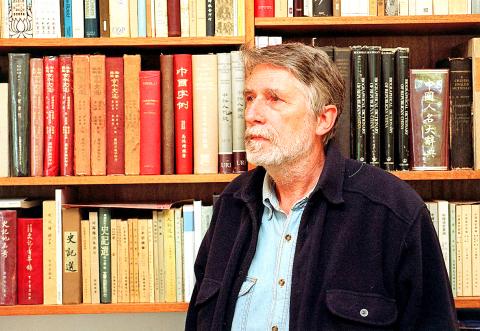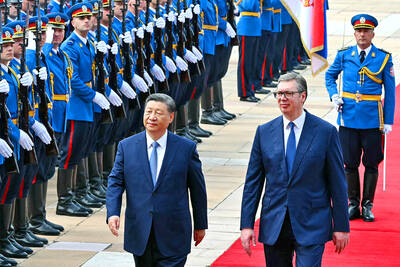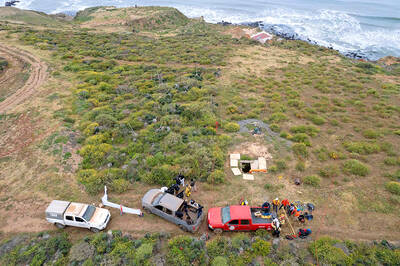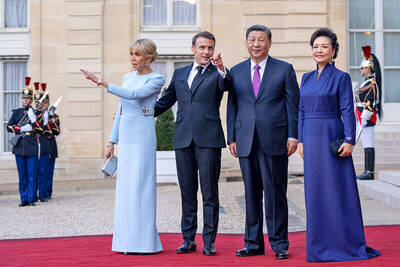Pierre Ryckmans, a Belgian-born scholar of China who challenged a romanticized Western view of former Chinese leader Mao Zedong (毛澤東) in the 1960s with his early portrayal of Mao’s Cultural Revolution as chaotic and destructive, died on Monday last week at his home in Sydney, Australia. He was 78.
His daughter, Jeanne Ryckmans, said the cause was cancer.
Ryckmans, who was better known by his pen name, Simon Leys, fell in love with China at the age of 19 while touring the country with fellow Belgian students in 1955.

Photo: AFP
One highlight was an audience with then-Chinese prime minister Zhou Enlai (周恩來). The man-made famine of Mao’s Great Leap Forward and his Cultural Revolution, which began in 1966 and ended about the time of Mao’s death, in 1976, were still in the future. There was much to be admired in the new China.
Yet pursuing his studies of Chinese art, culture and literature in the People’s Republic of China itself was not an option for a Westerner, so he settled in Taiwan, where he met his future wife, Chang Han-fang. He also lived in Singapore and Hong Kong.
It was in Hong Kong during the late 1960s that Ryckmans began to follow the turmoil just across the frontier, reading accounts in the official Chinese press about the Cultural Revolution and talking to former Mao supporters who had escaped it.
He began to find that the romantic view of Mao harbored by many Western intellectuals — as a progressive if flawed champion of the masses — was completely at odds with the cruelties of the Cultural Revolution, which sought to eradicate Chinese cultural traditions and Western capitalist influences and replace it with a Maoist orthodoxy. The movement led to purges, forced internal exiles and whipsaw shifts in the political winds, and it compelled Ryckmans to step into the arena of political commentary.
“Until 1966 Chinese politics did not loom large in my preoccupations, and I confidently extended to the Maoist regime the same sympathy I felt for all things Chinese, without giving it more specific thought,” Ryckmans wrote under his pseudonym in Chinese Shadows, which was first published in French in 1974.
“But the Cultural Revolution, which I observed from beginning to end from the vantage point of Hong Kong, forced me out of this comfortable ignorance,” he wrote.
His first account, The Chairman’s New Clothes, was also published in French, in 1971, a year after he had settled in Australia to teach at Australian National University. Ryckmans wrote the book under the name Simon Leys to disguise his identity so that he would not be banned from China.
He returned to China in 1972 on a six-month assignment as a cultural attache for the Belgian embassy in Beijing. The wanton destruction of the city’s ancient architectural heritage shocked him.
In Chinese Shadows, he wrote of his frantic search for some of the most magnificent of the city’s huge gates, which he assumed had been preserved, even though he knew that the city walls had been taken apart starting in the 1950s. The gates were gone.
“The destruction of the gates of Peking is, properly speaking, a sacrilege; and what makes it dramatic is not that the authorities had them pulled down but that they remain unable to understand why they pulled them down,” he wrote.
The Cultural Revolution, he found, had destroyed the beauty of Chinese culture and civilization without destroying what needed to be exorcised: the tyranny of arbitrary rule.
In a telephone interview, former Australian prime minister Kevin Rudd, a former student of Ryckmans, called him “the first of the Western Sinologists of the ’60s and ’70s to expose the truth of the cultural desecration that occurred during the Cultural Revolution, ripping away the political veneer from it all and exposing it for what it was: an ugly, violent, internal political struggle within the Chinese Communist Party led by Mao.”
Ryckmans was a frequent contributor to The New York Review of Books, Le Monde and other periodicals and the recipient of several literary prizes.

MONEY MATTERS: Xi was to highlight projects such as a new high-speed railway between Belgrade and Budapest, as Serbia is entirely open to Chinese trade and investment Serbian President Aleksandar Vucic yesterday said that “Taiwan is China” as he made a speech welcoming Chinese President Xi Jinping (習近平) to Belgrade, state broadcaster Radio Television of Serbia (RTS) said. “We have a clear and simple position regarding Chinese territorial integrity,” he told a crowd outside the government offices while Xi applauded him. “Yes, Taiwan is China.” Xi landed in Belgrade on Tuesday night on the second leg of his European tour, and was greeted by Vucic and most government ministers. Xi had just completed a two-day trip to France, where he held talks with French President Emmanuel Macron as the

With the midday sun blazing, an experimental orange and white F-16 fighter jet launched with a familiar roar that is a hallmark of US airpower, but the aerial combat that followed was unlike any other: This F-16 was controlled by artificial intelligence (AI), not a human pilot, and riding in the front seat was US Secretary of the Air Force Frank Kendall. AI marks one of the biggest advances in military aviation since the introduction of stealth in the early 1990s, and the US Air Force has aggressively leaned in. Even though the technology is not fully developed, the service is planning

INTERNATIONAL PROBE: Australian and US authorities were helping coordinate the investigation of the case, which follows the 2015 murder of Australian surfers in Mexico Three bodies were found in Mexico’s Baja California state, the FBI said on Friday, days after two Australians and an American went missing during a surfing trip in an area hit by cartel violence. Authorities used a pulley system to hoist what appeared to be lifeless bodies covered in mud from a shaft on a cliff high above the Pacific. “We confirm there were three individuals found deceased in Santo Tomas, Baja California,” a statement from the FBI’s office in San Diego, California, said without providing the identities of the victims. Australian brothers Jake and Callum Robinson and their American friend Jack Carter

CUSTOMS DUTIES: France’s cognac industry was closely watching the talks, fearing that an anti-dumping investigation opened by China is retaliation for trade tensions French President Emmanuel Macron yesterday hosted Chinese President Xi Jinping (習近平) at one of his beloved childhood haunts in the Pyrenees, seeking to press a message to Beijing not to support Russia’s war against Ukraine and to accept fairer trade. The first day of Xi’s state visit to France, his first to Europe since 2019, saw respectful, but sometimes robust exchanges between the two men during a succession of talks on Monday. Macron, joined initially by EU Commission President Ursula von der Leyen, urged Xi not to allow the export of any technology that could be used by Russia in its invasion